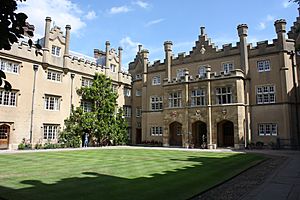Thomas Rymer facts for kids
Thomas Rymer (born around 1643, died 1713) was an English writer, critic, and historian. He is best known for creating a huge collection of old government papers called Foedera. This work gathered important agreements between the English Crown and other countries since the year 1101. He also held a special job as the King's official historian, called the Historiographer Royal. You might have heard the phrase "poetic justice" – he is believed to have invented it!
Contents
Thomas Rymer: Writer and Historian
Growing Up and School Days

Thomas Rymer was born in Yorkshire, England, around 1643. His father, Ralph Rymer, was a wealthy landowner. Thomas went to Northallerton Grammar School for eight years. He then studied at Sidney Sussex College, Cambridge, starting in 1659 when he was 16 years old.
Even though Thomas was still at Cambridge in 1662, he did not finish his degree. This might have been because his family faced money problems. His father was arrested in 1663 for being part of a plan against King Charles II. Although his older brother was also arrested, Thomas was not involved. In 1666, Thomas became a member of Gray's Inn, a place where people studied to become lawyers. He officially became a lawyer in 1673.
His Work as a Writer
Thomas Rymer's first published work was a translation of a book about poetry in 1674. He added his own thoughts about the rules for writing plays. Following these rules, he wrote a play called Edgar, or the English Monarch in 1677, but it was not successful.
In 1678, Rymer shared more of his ideas about plays in a letter. In this letter, he used the phrase "poetical justice" for the first time. This term means that good characters are rewarded and bad characters are punished in a story.
Rymer also helped translate other important books. He wrote a part of a collection of poems about Edmund Waller in 1688. He also wrote the Latin words carved on Edmund Waller's monument in a churchyard.
When the official historian, Thomas Shadwell, died in 1692, Thomas Rymer was chosen to take his place. He became the Historiographer Royal and earned £200 a year. Soon after, he wrote a book called A Short View of Tragedy (1693). In this book, he shared his strong opinions about plays by famous writers like William Shakespeare and Ben Jonson.
The Foedera Project
Rymer's most important work was a huge collection of historical documents called Foedera. This project aimed to gather "all the agreements, treaties, and alliances" made between the English Crown and other countries since 1101. The documents were written in Latin, with summaries in English.
He started working on Foedera in 1693 and spent the last 20 years of his life on it. It was a massive amount of research and copying. The first edition of Foedera had 20 volumes. Thomas Rymer prepared 16 of these volumes. The last two of his volumes were published after he died by his helper, Robert Sanderson. Sanderson then put together the last few volumes himself.
Over the years, different versions and updates of Foedera were published. It remains a very important source for historians studying agreements between England and other nations.
Later Life and Death
Thomas Rymer passed away on December 14, 1713. He was buried in a church in London. He did not have any immediate family when he died.
 | John T. Biggers |
 | Thomas Blackshear |
 | Mark Bradford |
 | Beverly Buchanan |

